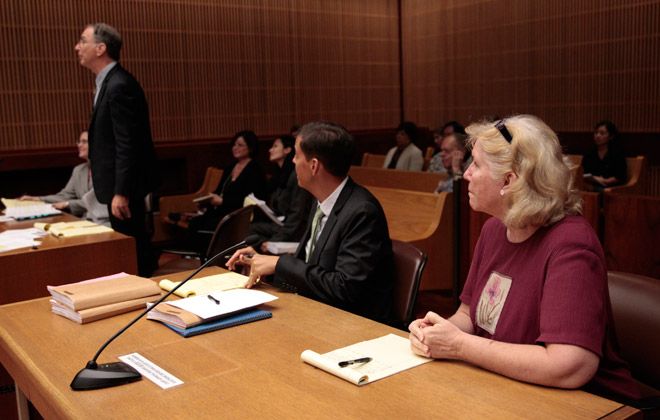Judge to decide residency case challenging Say

Attorney Lance Collins, center, representing voter Ramona Hussey, right, listened to remarks by attorney Lex Smith, representing state Rep. Calvin Say, Thursday in Circuit Court.
With the November election approaching, Circuit Judge Karen Nakasone said Thursday she would rule on whether to dismiss a legal challenge to state Rep. Calvin Say’s residency by the end of this month.
Attorneys for Say and the state House urged the judge to dismiss the challenge, arguing that only the House has the authority to decide whether lawmakers meet the state constitutional requirement of being qualified voters in the districts they represent.
Six Palolo voters said Say does not live in the Palolo state House district he has represented since 1976 and have filed the challenge to oust him from office. The voters said Say actually lives with his family at a home in Pauoa Valley. Say acknowledged he spends time with his family in Pauoa Valley but said his residence is a 10th Avenue home in Palolo.
Say, a Democrat, is facing Julia Allen, a Republican, and Keiko Bonk, a Green Party candidate, in November.
Nakasone has ordered Say to prove his residency in court, but the former speaker and the state House counter that the courts lack jurisdiction. The state Constitution gives the House the power to judge the qualifications of its members.
Lance Collins, an attorney for the voters challenging Say, said the House does not have the sole power. "If the House is allowed to decide what it means to be qualified, and they’re the only ones that have that power, then there’s no check," he told the judge, "and we don’t have a government that’s based on a system of checks and balances."
Don't miss out on what's happening!
Stay in touch with breaking news, as it happens, conveniently in your email inbox. It's FREE!
Nakasone said the one question Collins has given the court — whether Say is a qualified voter in the district he represents — "looks like it’s squarely trumped" by the provision in the state Constitution that grants oversight to the House. The judge said courts in other states with the same constitutional provision as Hawaii have ruled that the courts lack jurisdiction when faced with the same question.
But Collins argued that the development of case law in Hawaii is different from other states because Hawaii, which was under martial law after the Japanese attack on Pearl Harbor and World War II, has a "better appreciation with respect to the rights of individuals and the role of the courts in protecting the people and the rule of law."
Collins also wants the court to consider a declaration from Bonk in which she alleges that House Speaker Joseph Souki told her and Collins last year that the House leaves matters of residency for the courts to resolve.
But Lex Smith, an attorney for Say, and state Deputy Attorney General Deirdre Marie-Iha, who is representing the House, told the judge that Souki’s alleged comments are irrelevant. They want the judge to rule on the pure legal question of whether the House or the courts have the authority to weigh Say’s qualifications.
Nakasone, meanwhile, rejected a motion by Say to dismiss the case because the courts have previously denied challenges to Say’s residency based on voter registration.
Nakasone, however, said this case is different because it involves different voters who are challenging Say’s qualifications to serve in the House, not his voter registration.
Nakasone ruled last year that voter registration is a matter for the city clerk, not the courts. But the state Intermediate Court of Appeals held in April that the courts can hear the constitutional question of Say’s qualifications, sending the case back before the judge.




